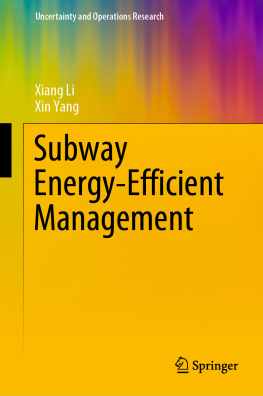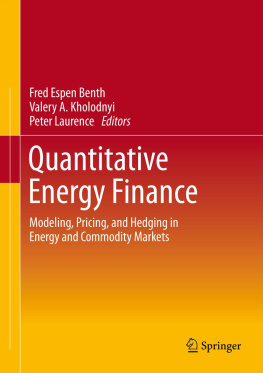Energy Pricing and Demand Management
Other Titles in This Series
Energy Resource Assessment, Alfred Petrick, Jr.
Energy Planning in Developing Countries, Peter M. Meier
Industrial Energy Management, Barry G. Tunnah
Rural Energy Planning in developing Countries, Romir Chatterjee
Renewable Energy for Industrialization and development, David John Jhirad
Also of Interest
Coal Myths and Environmental Realities: Industrial Fuel-Use Decisions in a Time of Change, Alvin L. Alm and Joan P. Curhan
Fuels and Chemicals from Oilseeds: Technology and Policy Options, Eugene B. Shultz, Jr., and Robert P. Morgan
World Petroleum Resources and Reserves, Joseph P. Riva, Jr.
Large-Scale Energy Models: Prospects and Potential, Robert M. Thrall, Russell G. Thompson, and Milton L. Holloway
Rural Energy to Meet Development Needs: Asian Village Approaches, edited by M. Nurul Islam, Richard Morse, and M. Hadi Soesastro
Energy Management Training Program Monograph Series
Peter M. Meier, Series Editor
Energy Pricing and Demand Management Mohan Munasinghe
Dr. Munasinghe emphasizes the importance of coordinated energy planning and pricing in less developed countries with particular reference to the interrelationships among the pricing policies adopted in various energy subsectors--electric power, petroleum, natural gas, coal, and traditional fuels (e.g., firewood, crop residues, and dung). In less developed countries the already complex problems typically faced by energy planners are exacerbated by high levels of market distortion, shortages of foreign exchange and resources for development, large numbers of poor households whose basic needs must be met, reliance on traditional fuels, and a relative paucity of energy data. The principal investment issues surrounding energy planning and the extent to which they influence pricing policy are also discussed.
Dr. Munasinghe is senior energy advisor to the president of Sri Lanka, chairman of the Computer and Information Technology Council (CINTEC) of Sri Lanka, and president of the Sri Lanka Energy Managers Association (SLEMA). He is an adjunct professor of the Institute for Technology Policy in Development at the State University of New York at Stony Brook. He is also a senior economist-engineer at the World Bank, Washington, D.C., presently on a leave of absence.
Energy Pricing and Demand Management
Mohan Munasinghe
Senior Energy Advisor to the President of Sri Lanka and Adjunct Professor of the Institute for Technology Policy in Development, State University of New York at Stony Brook
First published 1985 by Westview Press, Inc.
Published 2018 by Routledge
52 Vanderbilt Avenue, New York, NY 10017
2 Park Square, Milton Park, Abingdon, Oxon OX14 4RN
Routledge is an imprint of the Taylor & Francis Group, an informa business
Copyright 1985 Taylor & Francis
All rights reserved. No part of this book may be reprinted or reproduced or utilised in any form or by any electronic, mechanical, or other means, now known or hereafter invented, including photocopying and recording, or in any information storage or retrieval system, without permission in writing from the publishers.
Notice:
Product or corporate names may be trademarks or registered trademarks, and are used only for identification and explanation without intent to infringe.
Library of Congress Catalog Card Number: 84-51552
ISBN 13: 978-0-367-01715-6 (hbk)
About the Series
The Institute for Technology Policy in Development, founded in 1976, is an organized research unit of the State University of New York at Stony Brook. Its general mandate is to help develop the knowledge base, methodologies, and skills needed by policy makers throughout the world to formulate technology policies and to manage the transfer of new technologies. The mechanisms to be used by the Institute are conferences and workshops, research and policy issue analyses, and special training courses. These activities are designed to provide governments, public agencies and private organizations with an objective, independent, policy oriented source of knowledge, training, and technical assistance to help them deal with the problems and opportunities presented by changing or newly developing technologies. The specific technologies in which the Institute is concentrating its efforts at present are energy, computers, and bio-engineering.
The monographs in this series are based on the curriculum developed for the Institute's Energy Management Training Program (EMTP). This U.S. AID supported program, which began in 1978, is a collaborative effort with Brookhaven National Laboratory. The program has attained an international reputation for excellence in training middle and upper level planners and managers for dealing with the difficult problems of energy and development. Thus far, the EMTP has trained over 300 policy makers and upper level managers from 63 developing countries, many of whom now occupy positions of leadership as energy planners in their countries.
The material in the monographs has been perfected over the last six years to reflect the current trends in energy management in the developing countries. There are several reasons for bringing these monographs before a wider audience. As a whole, the series reflects a unique, comprehensive treatment of all aspects of energy planning and management in developing countries and is, therefore, suitable as instructional material at the graduate and post-graduate levels, as a reference collection, and as a comprehensive guide to the field. The series also reflects in its case material the diversity of the participants in the EMTP and the efforts and experience in the field over the past decade under a very wide set of resources and financial and economic conditions.
Dr. Robert Nathans, Director
Institute for Technology Policy in Development
State, University of New York-Stony Brook
The rapid increase in energy prices of the 1970s have had a dramatic effect on the world economy. As a result, new approaches have been developed over the last decade to solve energy problems at the national level. These techniques, which are based on the concept of integrated national energy planning (INEP), are particularly important for the oil-importing developing countries, which were hardest hit by the energy crisis.
Traditionally, the greatest emphasis had been placed on improving technical and financial efficiency. These considerations on the supply side of the supplydemand equation had been tackled with a remarkable degree of success, usually by scientists and engineers using technically- and financially-oriented solutions. More recently, energy economists have focused attention on the objectives of economic efficiency in the national context. These developments have had a growing and significant effect on the demand side, chiefly through the application of appropriate pricing policies based on economic costs, and the renewed interest in energy efficiency and conservation. On the supply side as well, the acceptance of economic arguments is reflected in the use of economic opportunity costs. These costs are represented by shadow prices, which are the true costs of economic resources and not purely financial or accounting costs. This book highlights the critical importance of correct national policies for energy pricing and demand management.











